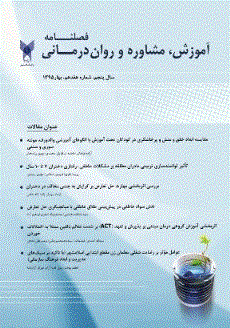اثربخشی آموزش گروهی درمان مبتنی بر پذیرش و تعهد (ACT) بر شدت علائم بالغین مبتلا به اختلالات خوردن
محورهای موضوعی : فصلنامه تعالی مشاوره و روان درمانیسودابه احمدی خوشبخت 1 * , سیدمحمود میرزمانی 2 , زینب علی مددی 3
1 - سایر
2 - پروفسور
3 - روانپزشک
کلید واژه: اثربخشی, اختلالات خوردن, درمان گروهی مبتنی بر پذیرش و تعهد (ACT),
چکیده مقاله :
چکیده در این تحقیق به اثربخشی آموزش گروهی درمان مبتنی بر پذیرش و تعهد (ACT) بر شدت علائم بالغین مبتلا به اختلالات خوردن پرداخته شده و سؤال اصلی بدین ترتیب تدوین شده است به چه میزان درمان گروهی مبتنی بر پذیرش و تعهد (ACT) بر نگرش به تغذیه و بازخورد خوردنموثر است؟ روش تحقیق، نیمه آزمایشی بوده و به مقایسه متغیر اصلی تحقیق در گروه آزمایش و گروه گواه پرداخته شده است. جامعه تحقیق حاضر را تمامی مراجعین مبتلا به اختلالات خوردن مراجعهکننده به کلینیک روانپزشکی بهار تشکیل میدهند. در تحقیق حاضر با پیروی از روش هدفمند، افراد دارای اختلال خوردن شناسایی شده و سپس با استفاده از روش نمونهگیری تصادفی تعداد 30 نفر (15 نفر گروه گواه و 15 نفر گروه آزمایش) از مراجعهکنندگان 18 تا 65 سال بهعنوان نمونه انتخاب شدند. در این تحقیق از دو پرسشنامه آزمون نگرش به تغذیه کارنر و همکاران، آزمون بازخورد خوردن گارنر و گارفینگل بهعنوان ابزار استفاده شده است که هر دو پرسشنامه دارای روایی و اعتبار مطلوبی هستند. در نهایت، با استفاده از مدل آماری تحلیل کواریانس یکطرفه به آزمون سؤالهای تحقیق پرداخته شد و یافتههای تحقیق نشان داد که آموزش گروه درمانی مبتنی بر پذیرش و تعهد (ACT) بر نگرش به تغذیه و بازخورد خوردن مؤثر بوده است.
Abstract: In this study, "The Effectiveness of Group Training based on Acceptance and Commitment Therapy (ACT) on the Symptoms of Adults Suffering from Eating Disorders" will be discussed and the question is raised: To what extent the group therapy based on acceptance and commitment (ACT) is effective on nutrition attitudes, and eating feedback? The research method has been quasi-experimental and the main variable has been compared in the experimental group and the control group. The present research community was composed of all clients with eating disorders referred to Bahar Psychiatric Clinic. In the present study, following the targeted approach, people with eating disorders were identified and then using random sampling, 30 clients aged 18 to 65 were selected as sample (15 persons formed the control group and 15 persons formed the experimental group). In this study, two questionnaires were used as tools: Coker and Roger Questionnaire, The Eating Attitudes Test (EAT-26), Garner et al., The Eating Attitudes Test, Garner & Garfinkel, and The Body Image Test, Fisher. All the two questionnaires have acceptable reliability and validity. Finally, using the statistical model One-way ANCOVA (analysis of covariance) the research questions were examined. The research findings showed that the group training based on acceptance and commitment therapy (ACT) is effective on the nutrition attitudes, and eating feedback.
_||_

